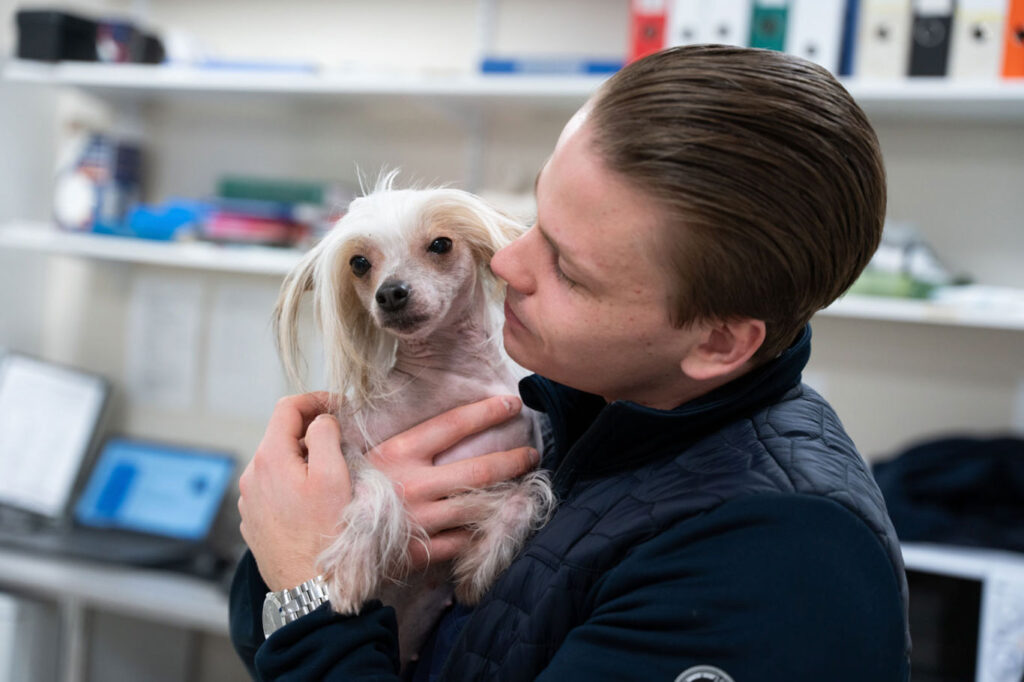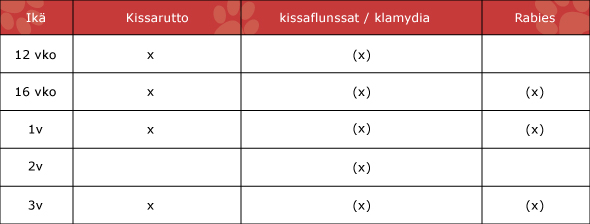Vaccinations
Don’t forget that a puppy or kitten needs deworming before a vaccination!When it comes to older animals, examination of stool sample is recommended to find out need for antiparasitic treatmetn.
Dogs

Normal vaccination programme for dogs:
https://wsava.org/wp-content/uploads/2025/06/Dogs-Vaccination-Table.pdf
Parvovirus
Canine parvovirus can cause severe, often bloody diarrhoea for a dog. If the puppies’ mother has been appropriately vaccinated, her milk will provide the puppies with antibodies that protect them until the age of 10–12 weeks. If necessary, a puppy can be vaccinated against parvo as early as at 7 weeks old (for example, if there is a parvo epidemic in the area). The diarrhoea caused by parvo can lead to a puppy’s death in a matter of hours from the start of the symptoms. An adult dog in good basic health will usually have milder symptoms.
The parvovirus can survive in the environment for long periods of time, which is why surfaces in kennels, for example, should be treated with a substance that kills the virus (such as Virkon S) to prevent it from becoming established there.
We recommend giving your pet a regular booster vaccination for the parvovirus, at least if you live in a densely populated area, if your dog takes part in competitions and other events with a lot of other dogs and if your dog is a female that you intend to breed. The immunity provided by a parvovirus vaccination given at the age of 1 year old will last for 3 years.
Kennel cough
Kennel cough is often a multiple infection caused by a virus and bacteria and can lead to a dog having tracheitis (an inflammation of the trachea). The dog will begin to cough and make honking sounds and may even develop a fever. A dog with good general health may stop coughing after a few days and may stay in good shape otherwise too (compare to the human “flu”). Of course, it is best to let your dog rest and make sure he or she has plenty of water to drink. If needed, your dog can be given cough medicine (ask your veterinarian about the dosage). In some cases, kennel cough may become prolonged and secondary diseases may develop, which is why we recommend taking your dog to the vet for examination if the cough has not stopped within a few days, or your dog’s general condition gets worse (for example, loss of appetite or a fever of more than 39.5 C°).
Sometimes the kennel cough vaccine only provides partial immunity (compare to the human flu vaccine). However, a vaccinated dog will likely only have mild symptoms. We recommend the kennel cough vaccine for dogs with sports hobbies and dogs with a problem with their basic health (such as a narrow windpipe, heart condition) which could be considerably aggravated by kennel cough. The KC vaccine, which is given in the nostril, provides a longer immunity than Pi, which is given as an injection.
Canine distemper
Canine distemper is a virus against which it is important to maintain good herd immunity. In the 90s, hundreds of dogs died of canine distemper in Finland and elsewhere when a widely used vaccine had provided inadequate immunity. The canine distemper virus first causes a feverish “flu” (discharge from the nostrils and eyes), which may appear to pass. It is then followed by a new fever stage and neurological symptoms may become apparent (shaking, cramping, etc.). Canine distemper is often fatal, and there is little hope of a dog with symptoms of a nervous disorder surviving. These days, the vaccine provides high immunity against the disease.
Hepatitis
Hepatitis is an inflammation of the liver caused by the adenovirus.
Rabies
Rabies is one of the most dangerous animal diseases in the world because it is fatal if not caught early on, also for people. The rabies virus finds its way to the nerve tissue, but symptoms may take up to 6 months to develop after exposure (bite). The behaviour of an animal with rabies changes: for example, a wild animal may seem unusually tame, a pet dog may act strangely, etc. The virus causes paralysis, starting from the throat and jaw muscles (which results in the dog’s inability to swallow water) and spreads all over the body. Rabies is currently prevalent, for example, in Estonia and elsewhere in Europe, which is why it is important to vaccinate dogs (and outdoor cats!) against it. There has been one case of rabies in Finland in 2003 involving a horse.
Read more:
https://www.kennelliitto.fi/en/dog-ownership/regulations-about-vaccinations-and-infectious-diseases
Show dogs are required to have valid vaccinations against distemper and rabies. You can read more about it here.
When travelling abroad, we recommend you talk to your vet about vaccine regulations! Your dog must have all the regular vaccinations in order and may also need to be vaccinated, for example, against Weil’s disease and have parasite prevention treatment.
You can find up-to-date information about the regulations on bringing an animal into Finland from abroad on the website of the Ministry of Agriculture and Forestry in Finland: ruokavirasto.fi
Cats

Vaccination programme for cats:

Feline distemper
The vaccine against feline distemper is the most important inoculation for cats. The feline distemper virus can survive in the environment for long periods of time and is fatal, especially for kittens. Feline distemper is caused by the feline parvovirus, which brings on strong diarrhoea and vomiting, among other symptoms. Similar to the parvovirus in dogs, this disease can cause an extremely quick or even sudden death. It can even cause a whole litter to die suddenly without any visible symptoms. An older cat has some chance of surviving if given intense supportive treatment.
There are numerous viruses that can cause respiratory tract infections in cats. There is a “triple vaccine” available against feline distemper, the herpesvirus and calicivirus. In addition, there is a vaccine against all of these and a fourth disease: feline chlamydiosis. Show cats are required to have the flu vaccine, which is also recommended for outdoor cats and for households with more than one cat. Cats that are free to roam outdoors are also in danger of being infected with numerous other viruses, not to mention the dangers posed by traffic, etc. Cats can be vaccinated also against the feline leukaemia virus.
Cats can be infected with rabies if bitten by an animal carrying the virus (for example, another cat). Read more about it in the “rabies” section under dogs.

